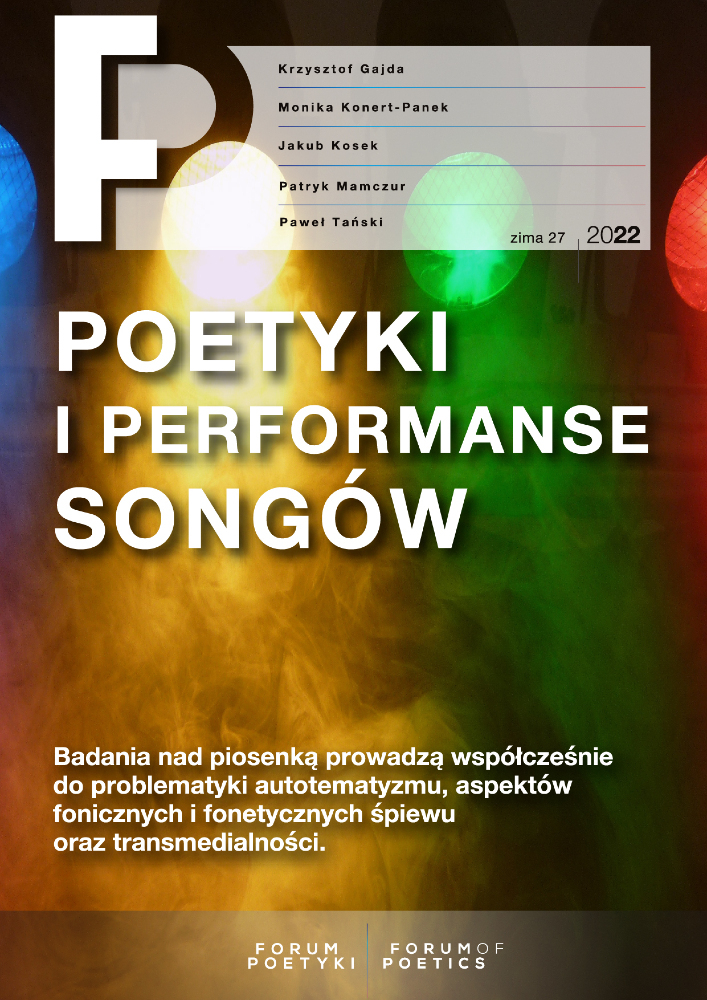Abstract
The paper analyzes the functioning of selected English phonetic features and inspirations related to them in Polish punk rock, and interprets the results in a broader stylistic and sociolinguistic context. It is based on the thesis that pronunciation in singing is often connected to expressing specific, potentially evolving social or stylistic meanings, and in the case of Anglophone Polish punk rock these meanings depend on trends within the genre. In most analyzed cases, English pronunciation displays a lot of interference from Polish and an unstylized sound, while features associated with Cockney are quite rare.
References
Agha, Asif. „The Social Life of Cultural Value”. Language and Communication 23 (2003): 231–273.
Barańczak, Anna. Słowo w piosence. Poetyka współczesnej piosenki estradowej. Wrocław: Zakład Narodowy im. Ossolińskich, 1983.
Beal, Joan C. „«You’re Not from New York City, You’re from Rotherham»: Dialect and Identity in British Indie Music”. Journal of English Linguistics 37, nr 3 (2009): 223–240.
Bell, Allan. „Falling in love again and again: Marlene Dietrich and the iconization of non-native English”. Journal of Sociolinguistics 5 (2011): 627–656.
Block, David. Second language identities. London – New York: Continuum International Publishing Group, 2010.
Boberg, Charles. „The Phonological Status of Western New England”. American Speech 76 (1) (2001): 3–29.Brylewski, Robert, Rafał Księżyk. Kryzys w Babilonie: autobiografia. Kraków: Wydawnictwo Literackie, 2012.
Budzyński, Tomasz. Soul Side Story. Poznań: In Rock, 2011.
Foege, Alec. „Green Day: The Kids Are Alright”. Rolling Stone, 22.09.1994. https://www.rollingstone.com/music/music-news/green-day-the-kids-are-alright-247150/.
Gibson, Andy, Allan Bell. „Popular Music Singing as Referee Design”. W: Style-Shifting in Public. New Perspectives on Stylistic Variation. Red. Juan Manuel Hernández Campoy, Juan Antonio Cutillas-Espinosa, 139–164. Amsterdam; Philadelphia: John Benjamins Publishing Company, 2012.
Gibson, Andy M. „Sociophonetics of Popular Music: Insights from Corpus Analysis and Speech Perception Experiments”. University of Canterbury, 2019. http://hdl.handle.net/10092/17892.
Gnoiński, Leszek, Jan Skaradziński. Encyklopedia polskiego rocka. Poznań: In Rock, 2001.
Gordon, Matthew J. 2004. „The West and Midwest: Phonology”, W: A Handbook of Varieties of English. Volume 1: Phonology, Red. Bernd Kortmann i Edgar W. Schneider, 338–350. Berlin/New York: Mouton de Gruyter, 2004.Grabowski, Krzysztof, Krzysztof Gajda. Gościu. Poznań: In Rock, 2010.
Hebdige, Dick. Subculture: the Meaning of Style. London; New York: Routledge, 2002.
Konert-Panek, Monika. „Akcent a wizerunek: foniczne aspekty stylu rockowego”. W: Kultura rocka. Twórcy – tematy – motywy. Red. Jakub Osiński, Michał Pranke, Paweł Tański, 1:55–67. Toruń: Wydawnictwo Naukowe Uniwersytetu Mikołaja Kopernika, 2019.
Konert-Panek, Monika. „«Just fake accent nicked from someone posh»: akcent w śpiewie jako wyraz tożsamości regionalnej i klasowej : przypadek Sleaford Mods”. W: Muzyka/Uniwersytet/Technologia/Emocje. Studia nad muzyką popularną. Red. Andrzej Juszczyk, Konrad Sierzputowski, Sylwia Papier, Natalia Giemza, 123–136. Kraków: AT Wydawnictwo, 2017.
Konert-Panek, Monika. „Overshooting Americanisation. Accent Stylisation in Pop Singing – Acoustic Properties of the BATH and TRAP Vowels in Focus”. Research in Language 15, nr 4 (2017): 371–384.
Konert-Panek, Monika. „Rozrywka i zaduma – foniczne aspekty tworzenia nastroju w tekstach Agnieszki Osieckiej”. W: Po prostu Agnieszka: w 75. rocznicę urodzin Agnieszki Osieckiej. Studia i materiały. Red. Igor Borkowski, 215–231. Wrocław: Wydawnictwo Uniwersytetu Wrocławskiego, 2011.
Konert-Panek, Monika, Mariusz Gradowski. „«Dublin in the rain is mine» – tożsamość i (prze)tworzona tradycja w piosence Big Fontaines D.C.” Czas Kultury 3 (2021): 41–47.
Księżyk, Rafał. Dzika rzecz: Polska muzyka i transformacja 1989–1993. Wołowiec: Wydawnictwo Czarne, 2020.
Lizut, Mikołaj. Punk Rock Later. Warszawa: Wydawnictwo Sic!, 2003.
Lybeck, Karen. „Cultural Identification and Second Language Pronunciation of Americans in Norway”. Modern Language Journal (Estados Unidos) 86, nr 02 (2002): 174–191.
Milroy, Lesley. „Language ideologies and linguistic change”. W: Sociolinguistic variation: critical reflections. Red. Carmen Fought, 161–177. Oxford: Oxford University Press, 2004.
Morrissey, Franz Andres. „Liverpool to Louisiana in One Lyrical Line: Style Choice in British Rock, Pop and Folk Singing”. W: Standards and Norms in the English Language. Red. Miriam A. Locher, 195–218. Berlin – New York: Mouton de Gruyter, 2008.
Ramet, Sabrina P. „Muzyka rockowa a polityka w Polsce: poetyka protestu i oporu w tekstach utworów rockowych”. Civitas Hominibus 13 (2018): 109–139.
Rutkowski, Mariusz. „(Anty)estetyka nazewnictwa punkrockowego”. W: Unisono w wielogłosie II: w kręgu nazw i wartości. Red. Radosław Marcinkiewicz, 131–138. Sosnowiec: Wydawnictwo GAD Records, 2011.
Silverstein, Michael. „Shifters, Linguistic Categories and Cultural Description”. W: Meaning in Anthropology. Red. Keith H. Basso, Henry A. Selby, 11–55. Albuquerque: University of New Mexico Press, 1976.
Simpson, Paul. „Language, Culture and Identity: With (Another) Look at Accents in Pop and Rock Singing”. Multilingua 18, nr 4 (1999): 343–367.
Sobkowiak, Włodzimierz. English Phonetics for Poles: A Resource Book for Learners and Teachers. Poznań: Wydawnictwo Poznańskie, 2004.
Sykulska, Karolina. „Język emocji – foniczne środki ekspresywne”. Poradnik Językowy 5 (2003): 6–20.
Tabouret-Keller, Andrée. „Language and Identity”. W: The Handbook of Sociolinguistics. Red. Florian Coulmas, 315–326. Oxford, UK; Cambridge, Mass.: Blackwell Publishers, 1997.
Tański, Paweł. Głosy i performanse tekstów. Literatura – piosenki – ciało. Toruń: Wydawnictwo Naukowe UMK, 2021.
Trudgill, Peter. „Acts of Conflicting Identity. The Sociolinguistics of British Pop-Song Pronunciation”. W: On Dialect: Social and Geographical Perspectives. Red. Peter Trudgill, 141–160. Oxford: Blackwell, 1983.
Watts, Richard, Franz Andres Morrissey. Language, the Singer and the Song: The Sociolinguistics of Folk Performance. Cambridge: Cambridge University Press, 2019.
Wilkoń, Aleksander. Język artystyczny: studia i szkice. Katowice: Śląsk, 1999
License
Authors of articles are responsible for securing the rights to other publications (texts, tables, drawings and other illustrations) quoted or reproduced in their texts.

